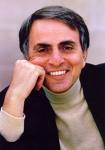Nov 09 2010
Carl Sagan Day
 Today, November 9th, would have been the 76th birthday of Carl Sagan. We lost him in 1996 at the age of 62 – way too early. But by that time he had already established himself as an influential science popularizer. Many of the current generation of science enthusiasts, myself included, look to Sagan as a significant source of inspiration.
Today, November 9th, would have been the 76th birthday of Carl Sagan. We lost him in 1996 at the age of 62 – way too early. But by that time he had already established himself as an influential science popularizer. Many of the current generation of science enthusiasts, myself included, look to Sagan as a significant source of inspiration.
For me the television series Cosmos was the transition from science enthusiast to scientific skeptic. In one episode Sagan explains why the evidence for alien visitation is not compelling. It is the first skepticism regarding UFOs that I remember being exposed to, and it was a revelation. For the first time I fully realized that I could not trust and believe every “science” documentary I saw on TV.
I have loved science as long as I can remember, and I watched just about every science show on TV that came to my attention. However – when I was younger I could not distinguish real science documentaries from pseudoscientific imitators. To me, a show about UFOs or ESP was just as authoritative as ones about astronomy or paleontology. It was all fascinating and fantastic. There was no mainstream skepticism regarding these topics, at least if there were it was obscure enough that I never ran across it. And so I watched In Search Of with Leonard Nimoy and believed all of it – Spock wouldn’t lie to me.
The only pseudoscience I was aware of at this time (basically my teenage years) was creationism, which I thought of as a lone aberration. Sagan was my introduction to the broader concept of pseudoscience and I credit him with the realization that I had to apply rigorous scientific principles to all claims. Following Cosmos I began to apply Sagan’s approach to evidence to everything I previously thought of as science, and beliefs started to fall one-by-one.
Sagan did much more, of course. He had the gift of exuding enthusiasm for the awesomeness of science and the view of the universe that it provides. He had the ability to step all the way back, to an outside vantage point, and then look in at the human condition and human beliefs and put them into a “cosmic” perspective. This has the effect of making even controversial topics sound less personal, the logic unavoidable. He could destroy an unscientific position, but not leave believers feeling as if they lost something – but rather that they have gained a new perspective and appreciation for the natural world and our ability to understand it.
If you have never watched Cosmos – watch it. It is a bit dated, but most of the content is still relevant. I also recommend all of Sagan’s books – better yet, listen to the audio versions where Sagan is reading.
I know that many within the skeptical community become uncomfortable with what seems like excessive praise bordering on hero-worship. That’s a healthy reaction. But it is OK to have role models, even intellectual heroes. We know they are human and imperfect. In fact, Sagan himself emphasized that science is a human endeavor – it is something that flawed and biased people do. Carl Sagan is definitely one of my role models as a science promoter, and I will always remember the important role he played in my personal voyage.






